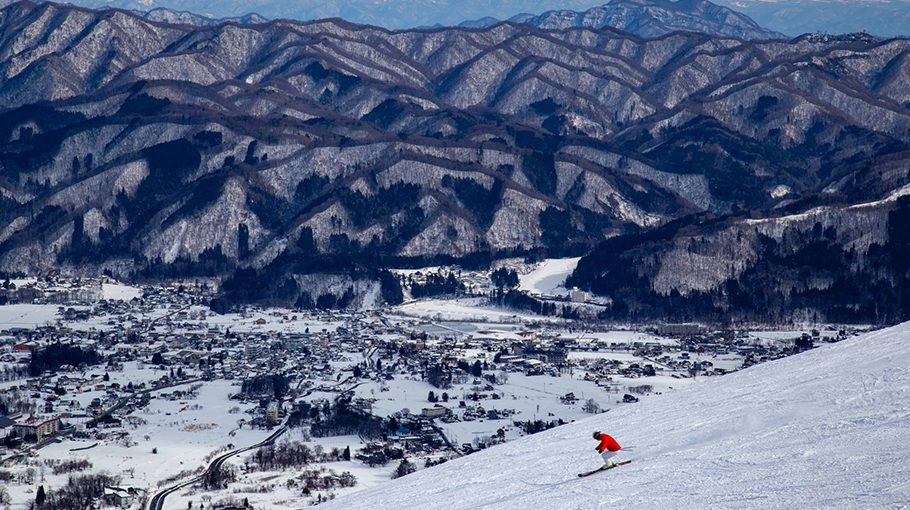Why mountain communities need the Winter Games
The dream of Olympic glory will be a driving force to get Japan’s young to take to the slopes

Although Japan’s ski industry has a long and storied history, its future is far from certain.
Resorts are reaching deeper into their pockets than previous decades have demanded and, in a battle to survive and prove their points of difference, they must continually update, improve and expand. With an aging skiing demographic and much of the younger generation apathetic toward winter sports and rural lifestyles in general, many of Japan’s countryside towns are facing a rapid population decline, with a number of ski areas similarly affected.
Interestingly, one factor that appears to protect smaller communities against such demographic shifts is whether such areas are connected to Olympic athletes or not. The resorts that have raised or nurtured Olympians appear better able to survive.
Take Hakuba Village in Nagano Prefecture, for example, which prior to the COVID-19 pandemic has seen its population gradually increase over the past 15 years — with 2019 at an all-time high.
Five athletes will be representing Hakuba in Beijing from Friday, all of whom were either raised in the ski resort town or moved to the valley as youths for its training opportunities.
Japan is one of many countries in which ski participation numbers
are declining. To survive, resorts need to attract younger visitors so
that the communities can generate interest, motivation and
opportunity in the future
Large resorts, enhanced training facilities and world-class coaches are natural draws for those interested in pursuing competitive snow sports, while the existence of affordable, family friendly training for younger children does well to retain existing residents, as well as bring new ones in.
The benefits filter down to basic things such as access to facilities. The Hakuba Ski Club, for example, provides four evenings and two full days of ski training weekly for children aged 6 and up, for ¥60,000 per season (which is inexpressibly cheap when compared to coaching fees overseas). From this year, lift passes for residents aged 15 and under are issued without charge, and, with former Olympians often working as club coaches in the area, it creates an inspired, nurturing environment in which future athletes can be raised.
One of these coaches, former Olympic skier Noriko Fukushima, sees not only the economic advantages of population increase, but also the snowballing effect that Olympic participation has on local youth.
“When kids see members from their community qualify for the Olympics, they aim high, bolstered because they see what’s possible,” Fukushima says. “And if they choose to pursue competitive skiing, the community can raise them to do it.”
Fukushima notes that not all residents in mountain communities are snow sport enthusiasts and that, for many, the winters — and unrelenting snowfall — can be long and difficult. Seeing the village represented at the Olympics by local residents is therefore morale boosting, pulling the community a little closer together.
So Matsudo, a 22-year-old representing Japan in the men’s mogul in Beijing, highlights the benefits of moving to resort towns that have an Olympic legacy behind them. Born in Kyoto, Matsudo moved to Hakuba when he was in high school in an effort to improve his skiing, although it wasn’t the only attraction for him.
“The most important thing for young people is to pursue what they love and enjoy doing, and for the coaches to create a fun training environment for those that choose snow sports,” Matsudo says from his hotel room in the Chinese capital.
Kokone Kondo, an 18-year-old representing Japan in the women’s freestyle ski events in Beijing, is the daughter of Makoto Kondo, a coach of the Hakuba Freestyle Force ski school and a pioneer of freestyle skiing.
Both father and daughter are recognizable figures in the local community, drawing from the strong Olympic bonds that connect Hakuba to the Winter Games and inspiring other generations to follow in their footsteps.
Some argue that it wouldn’t be possible for anyone to pursue snow sports on a professional level without the Olympic Games.
This is especially so for many mountainous communities worldwide, as they provide an ultimate goal to attain in the pursuit of excellence.
Japan is one of many countries in which ski participation numbers are declining. To survive, resorts need to attract younger visitors so that the communities can generate interest, motivation and opportunity in the future.
For the communities that succeed, it is often through the pursuit of reaching new heights in sports — frequently forged and fueled by the immortalized Olympic dream.
Nadine Robb is a ski writer and the founder of Hakuba Ski Concierge.
Source: Japan Times




